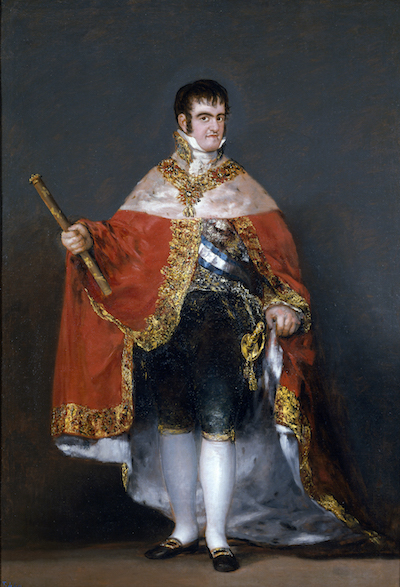
In 1807 and early 1808 Napoleon Bonaparte plotted to remove first King Carlos IV and then his son Ferdinand VII from the Spanish throne, eventually replacing them with his own brother, Joseph. Both former Spanish kings were forced to live in exile in France. In May 1808 the Spanish people rose up in rebellion against French rule. In the summer Britain sent an army under General Arthur Wellesley to liberate first Portugal and then Spain. The Peninsular War had begun. Co-operation between British and Spanish forces was haphazard at best. The Spanish generals and grandees fighting the French could not agree on a regent to lead their government and instead a Council of Regency was declared that did little to unite the nation or provide the strategic leadership needed.
In 1809 Richard Wellesley (1st Marquess Wellesley), brother of Arthur, became Foreign Secretary. Another brother, Henry, was Ambassador in Madrid, and yet another, William, was Chief Secretary in Ireland. The lack of a coherent government was one of Richard’s most pressing problems and he decided to attempt to rescue King Ferdinand from his exile at a chateau near Valençay. The agent he chose to lead the mission was styled himself Baron de Kolli. Of Irish descent he’d been employed as recruiter in Germany for the King’s German Legion, but also in France and Italy as a spy.
In January 1810 Kolli and his companion Albert Constant de St Bonnet arrived in London to meet with Richard Wellesley, who had also received clandestine overtures from the French Minister of Police Joseph Fouché offering to help secure the release of Ferdinand. Kolli and Wellesley met. Plans were laid, false papers and letters from King George III procured. Kolli was also supplied with a large sum of cash for expenses, and more significantly a small fortune in diamonds for Fouché.
St Bonnet and Kolli were landed in Quiberon Bay on the night of the 9th of March, from a flotilla of Royal Navy ship’s under the command of Admiral Sir George Cockburn. In his memoirs Kolli writes:
“I landed without the least difficulty and with the greatest secrecy; two boats manned with thirty sailors, armed with swords and pistols, approached the coast, within about thirty fathoms. Lieutenant Westfall first threw himself into the sea; all our seamen followed him; one of the stoutest of them took me on his shoulders, and carried me to land.”
St Bonnet struggled on the march inland and the two split up, making their own way to Paris. Meanwhile Fouché’s freelancing activities had begun to be suspected by others in the French government. Fouché decided that Kolli would have to be sacrificed to prove his loyalty to the Emperor. He issued a warrant for Kolli’s arrest and wrote a report for Napoleon. Kolli was captured at his lodging by a party of gendarmes. He had to hurriedly eat a note from one of his contacts but all the letters for Ferdinand were seized. Kolli was taken to the ministry of police in Paris and interrogated at length. St Bonnet was also arrested. The plot had failed completely before it had really begun. During the interrogation Kolli did tell his captors of the diamonds that he’d given to Fouché. However, Fouché managed to avoid arrest or execution but did lose his position as Minister of Police.
Kolli was imprisoned in dungeon of the Château de Vincennes:
“The sight of my dungeon filled me with sudden horror, and I began to hope for a speedy death, to save me from the lengthened agony which so many martyrs of royal fidelity hand been condemned to undergo.”
However, he was still to be involved in the tortuous intrigues in the French government. Foreign Minister Talleyrand was conducting secret negotiations with Richard Wellesley and offered to include a letter from Kolli with his next communication. Unfortunately peace would only come four years later after Napoleon had been defeated and only then would Kolli be released.
He travelled to Madrid in 1815 and finally met Ferdinand, being presented to the recently restored Spanish king by British Ambassador Henry Wellesley. Ferdinand presented him a medal and thanked him for the attempted rescue. Kolli served briefly with the Spanish army during the Hundred Days, getting captured again, but only for a short time as Napoleon was defeated once more. A curious postscript to the affair is that Kolli attempted to get the diamonds back, petitioning the French King Louis XVIII and claiming them as his own property, but without success.
References
Memoirs of The Baron De Kolli
Secret Service – Elizabeth Sparrow

Available from Amazon or directly from the publisher Helion, which means I make a little more rather than Amazon getting all the profit!
Splendid, splendid, splendid!
LikeLiked by 1 person
Interesting blurb.
I hope the Spanish enjoyed having Ferdinand VII back on the throne. He was without question one of the most reactionary, unenlightened, and terminally stupid monarchs to occupy space in the entire 19th century. He brought back the Inquisition, declared at one point that the earth was indeed flat, enriched the nobility and destroyed what little remained of the middle class, and made certain that Spain would remain a third-rate nation until sometime last week.
Besides, he certainly was a fright to look at.
Can’t imagine why anyone would waste his time or risk his life or health to “rescue” this buffoon.
LikeLike
Simply because Spanish people didn’t want to be ruled by a bigger buffon and invader, Jose’ Bonaparte better known as Pepe Botella.
LikeLike